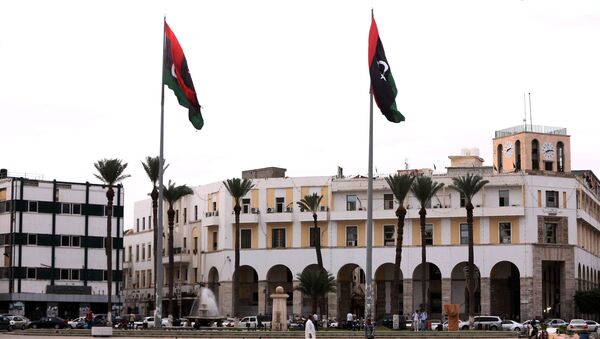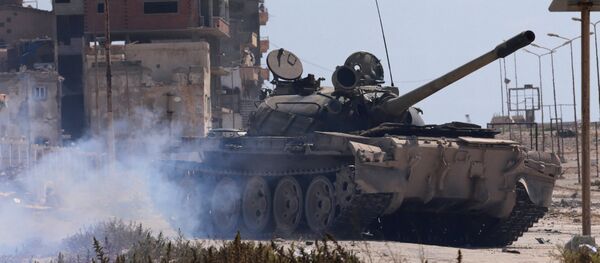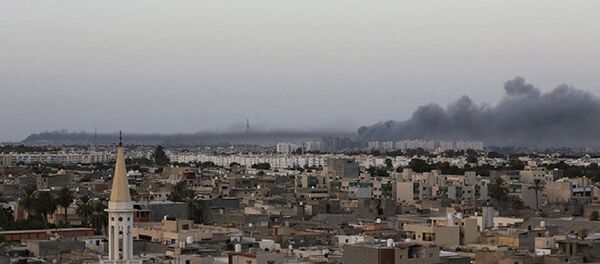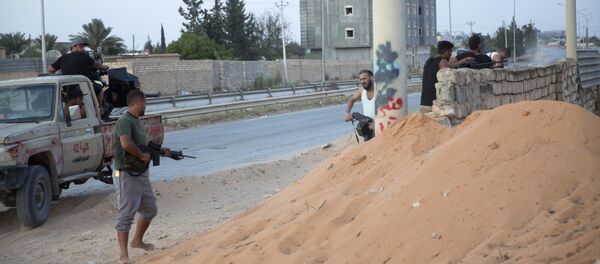According to Issa, the government of Fayez al-Sarraj lacks legitimacy because it has not passed a parliamentary vote of confidence. In the future, the Parliament will not work with the government of Fayez al-Sarraj, claimed Issa.
Sputnik: The prime minister of the Government of National Accord (GNA) of Libya, Fayez al-Sarraj, sent on Wednesday a letter to the UN Security Council seeking intervention to protect Tripoli from Field Marshal Khalifa Haftar’s advancing Libyan National Army (LNA). How do you comment on these actions?
Aguila Saleh Issa: Obviously, the Defence Minister of the so-called Government of National Accord wants to keep the situation unchanged. It was this government that caused today's crises in Libya.
It has already appealed to the UN Security Council when the LNA conducted operations in the south of the country. It is rather strange when they complain to the UN about an army that fights against terrorists.
Sputnik: What is the purpose of your memorandum sent to the UN Security Council?
Aguila Saleh Issa: We indicated in this document that the Libyan National Army is acting legally, because, firstly, it fulfils the previously reached political agreements (generally known as the "Libyan Political Agreement" or the "Skhirat Agreement") on the withdrawal of armed groups from the capital Tripoli and from other parts of Libya as well.
I would note that the government of Fayez al-Sarraj used the armed groups for its own purposes. As a result, the latter imprisoned the government and robbed the treasury. Secondly, in 2014, the parliament issued a decree dissolving armed groups in Tripoli.
The constitution of any state in the world gives the armed forces constitutional protection. This constitutional protection is the protection of people, state property, and state organisations. The army’s actions are in line with the concluded political agreements ("Skhirat Agreement"), the Constitution, and a decision of the Libyan Parliament (Libyan House of Representatives.)
We assured the Security Council and the international community that the lives of Libyans, their holy places, property, security, and freedom are being safeguarded by the Libyan National Army’s soldiers. It is impossible to imagine that soldiers will attack ordinary citizens because we are all one flesh and blood.
Sputnik: Why does your Parliament (HoR) not recognise the Government of National Accord?
Aguila Saleh Issa: The government, which has twice lost a vote of confidence in the Libyan Parliament, should be dissolved and re-formed in accordance with parliamentary norms. One major objection is that a person who was involved in the formation of the government cannot control the state.
Moreover, this figure was delivered from abroad; no one has been putting forward his candidacy.
The government of Fayez al-Sarraj lacks legitimacy because it has not passed a parliamentary vote of confidence. In future, the parliament will by no means work with this government of Fayez al-Sarraj.
Sputnik: Will there be any reaction from the international community to Fayez al-Sarraj's request to intervene?
Sputnik: Why hasn’t the referendum law been introduced to the people as the government of Fayez al-Sarraj claims? (According to Tripoli’s plans, the referendum should have been held by the election commission by the end of February 2019)
Aguila Saleh Issa: The law was presented to the UN High Commissioner for Human Rights.
There they confirmed its readiness although the Government of National Accord did not allocate money to the High Commissioner’s Office.
Sputnik: But the High Council of State of Libya opposed the law on the referendum, they say, new articles were added (The High Council of State, also known as the Supreme Council of State, can advise the interim Government of National Accord and the House of Representatives)?
Aguila Saleh Issa: The High Council of State cannot oppose the referendum law.
Its power entails for it to only provide advice on legislative and judicial issues. But through its actions, it cannot interfere with the holding of a referendum.
Aguila Saleh Issa: Russian policy is based on respecting the sovereignty of other countries. It cooperates with other states on a partnership basis.
Other states act differently. If, after the liberation of Tripoli, Russia will have the opportunity and desire to help reach an agreement between the political forces of Libya, we would welcome it.
Sputnik: Is it possible to conclude an agreement now?
Aguila Saleh Issa: Unfortunately, Fayez al-Sarraj sat at the same negotiating table with Khalifa Haftar several times.
They have agreed on some issues but when al-Sarraj returned to Tripoli, he again started resolving all issues by force. As a result, none of the agreements was implemented.
Sputnik: How did the arms embargo affect the Libyan National Army?
Aguila Saleh Issa: Because of the embargo the Libyan National Army took time to prepare the operation against the armed groups.
Sputnik: What is the Libyan National Army fighting with now?
Aguila Saleh Issa: The army uses weapons that it takes from armed groups. The official representative of the Libyan Armed Forces has repeatedly stated that it had seized modern weapons from the militants.We fight with seized arms, strong soldiers, and competent leadership.
The roots of the current confrontation in Libya go back to 2015, when, with the mediation of the UN and a number of interested actors, an attempt was made to overcome the chaos generated by a NATO invasion that ended with the overthrow of Muammar Gaddafi.
Then in the Moroccan city of Skhirat agreements on the establishment of the Presidential Council and the Government of National Accord were signed.
The crisis in the country was supposed to be resolved by ensuring the representation of the leading political forces of Libya. However, in practice, the Islamists and, above all, the Muslim Brotherhood took the lead in these structures.
This gave rise to the existing split and de facto dual power: the GNA and Presidential Council headed by Fayez al-Sarraj in Tripoli, and the legislature House of Representatives chaired by Aguila Saleh Issa, supported by Field Marshal Khalifa Haftar’s army, in Tobruk in the east of the country.
Views and opinions expressed in this article are those of Aguila Saleh Issa and do not necessarily reflect those of Sputnik.







